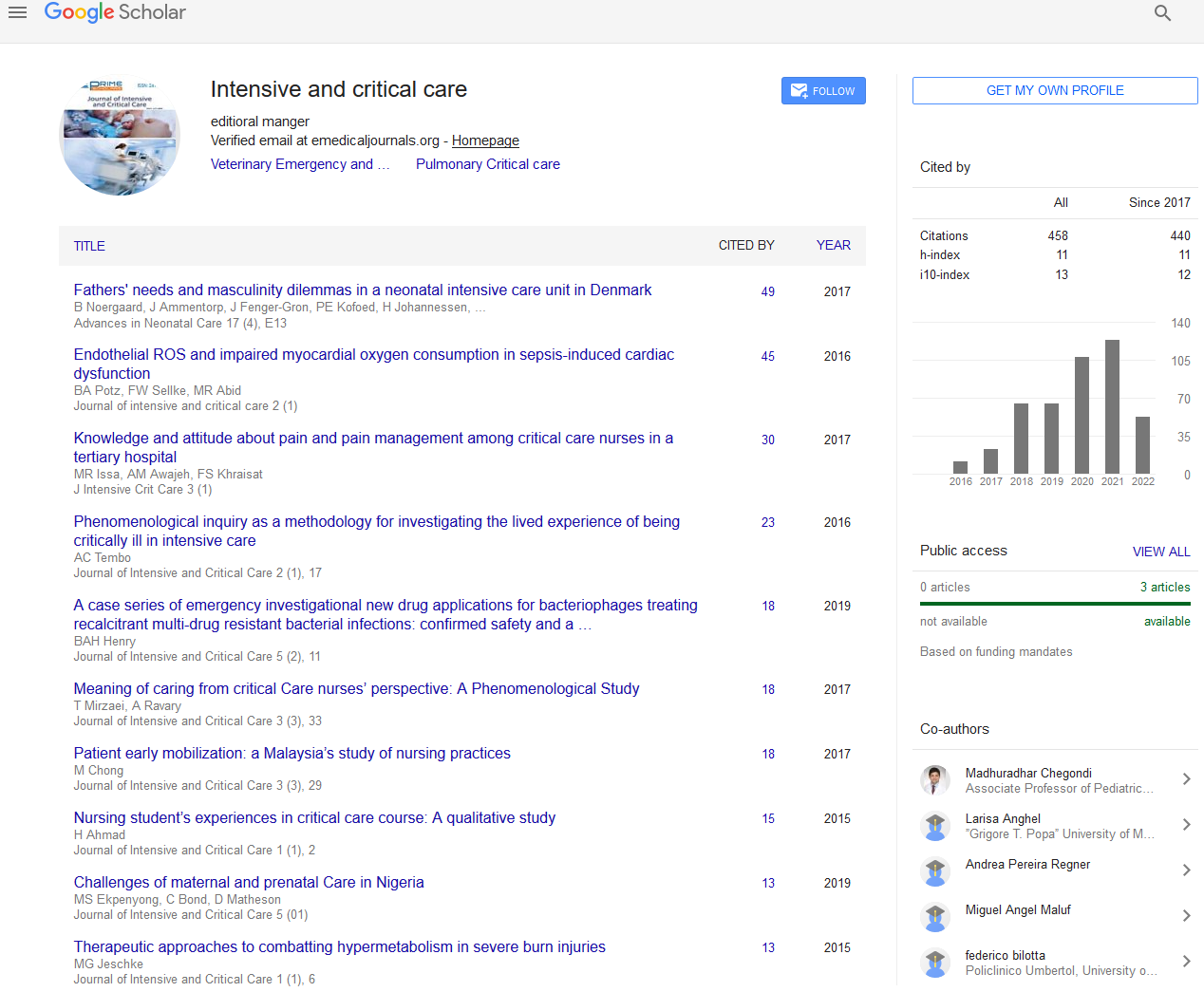Manuel Plomer1* and Justus de Zeeuw2
1Medical Affairs CHC Germany, Sanofi-Aventis Deutschland GmbH, Industriepark Höchst, D-65926, Frankfurt am Main, Germany
2Medical Specialist for Internal Medicine, Pneumology and Sleep Medicine, Cologne, Germany
*Corresponding Author:
Dr. Manuel Plomer
Medical Manager, Medical Affairs CHC Germany
Sanofi-Aventis Deutschland GmbH, Industriepark Höchst
D-65926 Frankfurt am Main, Germany.
Tel: 49 69 305 36803
E-mail: manuel.plomer@sanofi.com
Received date: August 22, 2017; Accepted date: August 23, 2017; Published date: August 30, 2017
Citation: Plomer M, de Zeeuw J (2017) More than Expectorant: New Scientific Data on Ambroxol in the Context of the Treatment of Bronchopulmonary Diseases. J Intensive & Crit Care Vol. 3 No. 3:37
Background:Ambroxol has been established for decades in the treatment of acute and chronic respiratory diseases. A reassessment of the benefit-risk was conducted recently. Objective: What new scientific data, relevant for the treatment of bronchopulmonary diseases, were published in the last decade? Method: Systematic literature search via http://www.pubmed.gov with the search term “ambroxol”, covering the publication period from 2006 to 2015. Nonrelevant publications were excluded manually. Results: 64 relevant publications could be identified covering both, clinical and preclinical research. Conclusion: The traditional indication of ambroxol as an expectorant is confirmed but new results revealed a better understanding of the various mechanisms of action of ambroxol and the benefits for special patient populations. The available data suggest the use of ambroxol as an adjuvant in anti-infective therapy, particularly in case of infections with biofilm-producing pathogens. Lungprotective properties are discussed in both infants and severely ill adult patients. First results in rare diseases, such as lysosomal storage disorders, show a potential benefit of ambroxol. However, final evidence for the clinical relevance in this special field has yet to be provided.
Keywords
Ambroxol; COPD; Bronchitis; Surfactant; Lysosomes; Biofilm
Introduction
Ambroxol is an active metabolite of bromhexine and has been established for decades in the treatment of acute (e.g. bronchitis) and chronic respiratory diseases (e.g. COPD) [1-3]. Pharmacological and clinical studies showed the mucoregulative and secretagogue properties of ambroxol [4]. In 2015 the European Medicine Agency (EMA) reassessed the benefitrisk profile of ambroxol in a PRAC (Pharmacovigilance Risk Assessment Committee) - referral [5,6]. A lately published review revealed new scientific data on ambroxol which can be relevant for treatment of bronchopulmonary diseases thus potentially contributing to the positive benefit-risk profile of the compound [7]. This mini-review intends to summarize these findings accordingly.
A systematic literature research in Medline (pubmed.gov) with the search term “ambroxol” during the publication period from 01.01.2006 until 31.12.2015 was conducted. The search led to 236 hits, of which 64 relevant publications were identified and included. Specific findings are summarized.
Chronic Bronchopulmonary Diseases
Anti-inflammatory properties of ambroxol on granulocytes and mast cells were shown in vitro and in a mouse models in the context of asthma therapy [8,9]. In two controlled clinical investigations ambroxol was used as an adjuvant in COPD therapy. In both publications the authors describe positive effects on the prevention or therapy of exacerbations [10,11]. Though the study designs of these trials do not allow a final conclusion (missing placebo controls), they confirm results of previous investigations [2,12].
Acute Bronchopulmonary Diseases
A pilot study in elderly adults showed effects of ambroxol on the prevention of acute respiratory infections, compared to an active control [13]. A further clinical trial in children with acute pneumonia describes a higher effective rate (sum score of different symptoms) in the group with concomitant ambroxol inhalation, compared to standard care alone [14].
Anti-Infective Properties
Besides the influence of ambroxol on mucus clearance, further antiviral, antibacterial and antifungal properties have recently been described and published. Different working groups conclude direct and indirect anti-infectious properties (such as increasing bioavailability of antibiotics) by ambroxol [15-26]. Therefore, the available database suggests that the efficacy of ambroxol in COPD and acute bronchitis might at least partly be mediated by these pharmacological properties. It is worth to mention that there is a special interest for ambroxol in the scientific community as an adjuvant in treatment of infections with biofilm-producing pathogens such as Pseudomonas aueroginosa and Candida albicans [15,16,20]. First studies in animal models provide preliminary evidence for an improved penetration of anti-infectives such as vancomycin and voriconazole in the presence of ambroxol through the biofilm-barriers of these pathogens [21,24] and even direct inhibition of biofilm formation by ambroxol was shown in a pneumonia rat model [20].
Lung-Protective Properties
A meta-analysis of randomized controlled trials provides evidence for ambroxol’s protective effect of immature lungs of pre- and new-born infants. The relative risk for a neonatal respiratory distress syndrome under ambroxol therapy was 0.38 compared to control, according to the conclusion of the authors [27].
Further studies were published investigating the prevention of pulmonary complications in severely ill patients by ambroxol [28-34].
Worth to mention is one trial in lung cancer patients undergoing lobectomy. In this study, short-term perioperative treatment with ambroxol reduced both the rate of postoperative pulmonary complications and the duration of postoperative hospital stay [29].
Rare Diseases
A new potential treatment area for ambroxol, as suggested by the rising number of publications in this field, is the treatment of lysosomal storage disorders such as Morbus Gaucher [35-42]. In an uncontrolled pilot study, the symptoms of Morbus Gaucher patients did not worsen under ambroxol treatment for 6 months [43]. Further studies are needed to confirm these preliminary findings.
Conclusion
In summary ambroxol is still investigated in both preclinical and clinical trials by research groups worldwide. Recent findings suggest relevant pharmacological and clinical effects particularly in treatment of infections with biofilm-producing pathogens and the protection from pulmonary complications after surgery or in intensive care. Further trials are needed to prove the encouraging finding in patients with lysosomal storage disorders.
References
- Malerba M, Ragnoli B (2008) Ambroxol in the 21st century: Pharmacological and clinical update. Expert Opin Drug Metab Toxicol 4: 1119-1129.
- Olivieri D (1987) Ambroxol for the prevention of chronic bronchitis exacerbations: Long-term multicenter trial. Protective effect of ambroxol against winter semester exacerbations: A double-blind study versus placebo. Respiration 51:42-51.
- Matthys H (2000) Efficacy and tolerability of myrtol standardized in acute bronchitis. A multi-centre, randomised, double-blind, placebo-controlled parallel group clinical trial vs. cefuroxime and ambroxol. Arzneimittelforschung 50: 700-711.
- Paleari D (2011) Ambroxol: A multifaceted molecule with additional therapeutic potentials in respiratory disorders of childhood. Expert Opin Drug Discov 6: 1203-1214.
- European Medicines Agency (EMA) (2015) EMA/PRAC/800767/2015 - Revised assessment report - Ambroxol and Bromhexine containing medicinal products.
- European Medicines Agency (EMA) (2016) European Commission final conclusion on the Ambroxol and bromhexine Article-31 referral - Annex II - Scientific conclusion.
- Plomer M, de Zeeuw J (2017) More than expectorant: New scientific data on ambroxol in the context of the treatment of bronchopulmonary diseases. MMW Fortschr Med 159: 22-33.
- Dong C (2012) Anti-asthmatic agents alleviate pulmonary edema by upregulating AQP1 and AQP5 expression in the lungs of mice with OVA-induced asthma. Respir Physiol Neurobiol 181: 21-28.
- Zhi QM, Yang LT, Sun HC (2011) Protective effect of ambroxol against paraquat-induced pulmonary fibrosis in rats. Intern Med 50: 1879-1887.
- Yakoot M, A Salem, AM Omar (2010) Clinical efficacy of farcosolvin syrup (ambroxol-theophylline-guaiphenesin mixture) in the treatment of acute exacerbation of chronic bronchitis. Int J Chron Obstruct Pulmon Dis 5: 251-256.
- Sushko VO (2015) Optimization of chronic obstructive pulmonary disease treatment in clean-up workers of the Chornobyl NPP accident in the remote period after irradiation. Probl Radiac Med Radiobiol 20: 457-466.
- Cegla UH (1988) Long-term therapy over 2 years with ambroxol (Mucosolvan) retard capsules in patients with chronic bronchitis. Prax Klin Pneumol 42: 715-721.
- Nobata K (2006) Ambroxol for the prevention of acute upper respiratory disease. Clin Exp Med 6: 79-83.
- Yang F (2015) Oxygen-driving and atomized mucosolvan inhalation combined with holistic nursing in the treatment of children severe bronchial pneumonia. Pak J Pharm Sci 28: 1477-1480.
- Li F (2008) Effects of ambroxol on alginate of mature Pseudomonas aeruginosa biofilms. Curr Microbiol 57: 1-7.
- Lu Q (2010) Ambroxol interferes with Pseudomonas aeruginosa quorum sensing. Int J Antimicrob Agents 36: 211-215.
- Lee SH (2015) A novel inhaled multi-pronged attack against respiratory bacteria. Eur J Pharm Sci 70: 37-44.
- Cheng C (2015) Ciprofloxacin plus erythromycin or ambroxol ameliorates endotracheal tube-associated Pseudomonas aeruginosa biofilms in a rat model. Pathol Res Pract 211: 982-988.
- Lu Q (2013) Effects of combined treatment with ambroxol and ciprofloxacin on catheter-associated Pseudomonas aeruginosa biofilms in a rat model. Chemotherapy 59: 51-56.
- Li F (2011) Effect of ambroxol on pneumonia caused by Pseudomonas aeruginosa with biofilm formation in an endotracheal intubation rat model. Chemotherapy 57: 173-180.
- Zhang Y (2015) Synergy of ambroxol with vancomycin in elimination of catheter-related Staphylococcus epidermidis biofilm in vitro and in vivo. J Infect Chemother 21: 808-815.
- Chen F, YX Zhang, CQ Zhang (2015) Effect of ambroxol on the concentration of cefotaxime in the bronchoalveolar lavage fluid of rats with pulmonary fibrosis. Exp Ther Med 9: 539-542.
- Hafez MM (2009) Activity of some mucolytics against bacterial adherence to mammalian cells. Appl Biochem Biotechnol 158: 97-112.
- Pulcrano G (2012) Ambroxol influences voriconazole resistance of Candida parapsilosis biofilm. FEMS Yeast Res 12: 430-438.
- Rene HD (2014) Effects of ambroxol on Candida albicans growth and biofilm formation. Mycoses 57: 228-232.
- Yamaya M (2014) Ambroxol inhibits rhinovirus infection in primary cultures of human tracheal epithelial cells. Arch Pharm Res 37: 520-529.
- Zhang ZQ (2013) Prevention of respiratory distress syndrome in preterm infants by antenatal ambroxol: A meta-analysis of randomized controlled trials. Am J Perinatol 30: 529-536.
- Ulas MM (2008) Protective effect of ambroxol on pulmonary function after cardiopulmonary bypass. J Cardiovasc Pharmacol 52: 518-523.
- Refai M (2009) Short-term perioperative treatment with ambroxol reduces pulmonary complications and hospital costs after pulmonary lobectomy: A randomized trial. Eur J Cardiothorac Surg 35: 469-473.
- Wang X (2015) Perioperative Lung Protection Provided by High-Dose Ambroxol in Patients with Lung Cancer. Cell Biochem Biophys 73:281-284.
- Xia DH (2010) The protective effects of ambroxol on radiation lung injury and influence on production of transforming growth factor beta1 and tumor necrosis factor alpha. Med Oncol 27: 697-701.
- Dreger H (2011) Fast-track pulmonary conditioning before urgent cardiac surgery in patients with insufficiently treated chronic obstructive pulmonary disease. J Cardiovasc Surg 52: 587-591.
- Li Q, Yao G, Zhu X (2012) High-dose ambroxol reduces pulmonary complications in patients with acute cervical spinal cord injury after surgery. Neurocrit Care 16: 267-272.
- Baranwal AK, Murthy AS, Singhi SC (2015) High-dose oral ambroxol for early treatment of pulmonary acute respiratory distress syndrome: An exploratory, randomized, controlled pilot trial. J Trop Pediatr 61: 339-350.
- Maegawa GH (2009) Identification and characterization of ambroxol as an enzyme enhancement agent for Gaucher disease. J Biol Chem 284: 23502-23516.
- Ambrosi G (2015) Ambroxol-induced rescue of defective glucocerebrosidase is associated with increased LIMP-2 and saposin C levels in GBA1 mutant Parkinson's disease cells. Neurobiol Dis 82: 235-242.
- Lukas J (2015) Enzyme enhancers for the treatment of Fabry and Pompe disease. Mol Ther 23: 456-464.
- Babajani G (2012) Pharmacological chaperones facilitate the post-ER transport of recombinant N370S mutant beta-glucocerebrosidase in plant cells: evidence that N370S is a folding mutant. Mol Genet Metab 106: 323-329.
- Bendikov-Bar I (2013) Ambroxol as a pharmacological chaperone for mutant glucocerebrosidase. Blood Cells Mol Dis 50: 141-145.
- Suzuki T (2015) Correction: Expression of human gaucher disease gene GBA generates neurodevelopmental defects and ER stress in drosophila eye. PLoS ONE 10: 0135619.
- Suzuki T (2013) Expression of human Gaucher disease gene GBA generates neurodevelopmental defects and ER stress in Drosophila eye. PLoS ONE 8: 69147.
- McNeill A (2014) Ambroxol improves lysosomal biochemistry in glucocerebrosidase mutation-linked Parkinson disease cells. Brain 137: 1481-1495.
- Zimran A, G Altarescu, D Elstein (2013) Pilot study using ambroxol as a pharmacological chaperone in type 1 Gaucher disease. Blood Cells Mol Dis 50: 134-137.

